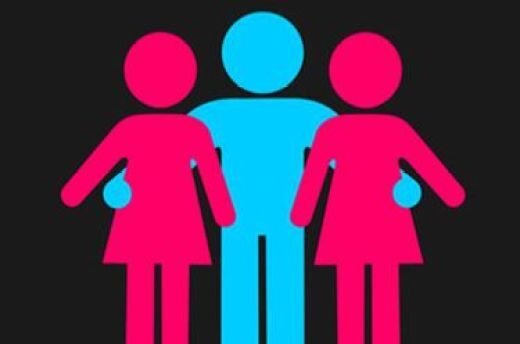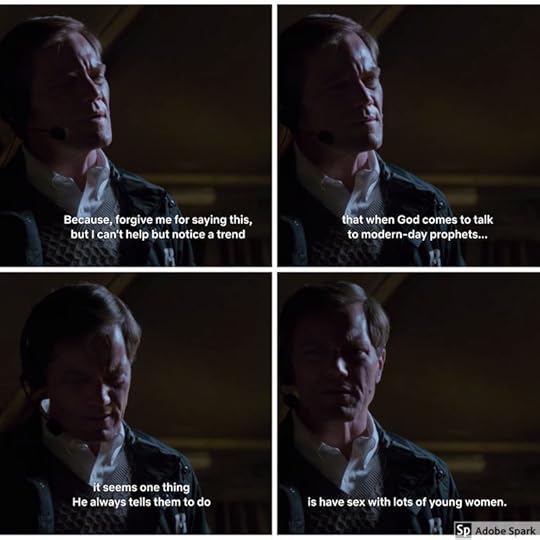Exponent II's Blog, page 106
June 30, 2022
Retrospective for Exponent II’s 50th—We Need Your Feedback!
 Masthead from Exponent II’s first issue
Masthead from Exponent II’s first issueThe 50-year anniversary of Exponent II is only two years away!
To commemorate the longevity and impact of this organization, Heather Sundahl and I are working to put together a retrospective book on the paper/magazine. The main focus will be to celebrate its origins, highlight the various editors and their contributions, and select essays and poems from throughout the years that reflect the trends in Mormonism, feminism, and Mormon feminism.
We would like to hear from our incredible volunteers who have carried this organization as well as our friends who have been long-time subscribers and supporters. We have created a google form to ask about pieces that stand out in different decades, highlights from the retreat that may have been published in the magazine or blog, and what you would hope to see in a retrospective book.
Which pieces from Exponent II’s history have stayed with you? We want to hear! And we so appreciate the time it takes to give this feedback. Thank you!
June 28, 2022
Wounded, Broken, Not Yet Defeated
Blood drips from the warrior’s ribs. The spear cut deeply. Still, she stands. Though wounded, she is not yet defeated.
We have been wounded. But we are not yet conquered. We fight, but we do not fight alone.
Four of the Justices who overturned Roe said during their confirmation hearings that Roe was settled law. Justice Thomas said he had no opinion. They lied.
Justice Kennedy voted in favor of the Mississippi law but not on a complete overturn of Roe. He is no less culpable for the spear thrust in our side.
We fight for more than abortion access. We fight for our ability to direct our own lives, to live by the dictates of our own conscience and to allow everyone else to do the same.
We fight alongside those who will die from abortion attempts.
We fight alongside those who will die from high risk pregnancies in a country with the highest maternal mortality rate of any industrialized nation.
We fight alongside the families who will bury loved ones.
We fight alongside people who will be forced to carry a reminder of rape.
We fight alongside the children born of those rapes who will carry lifelong trauma.
We fight alongside the children who will be abused.
We fight alongside the children who will grow up in poverty with no social safety net.
We fight alongside parents as they watch their children suffer.
We fight alongside the teenagers who don’t know enough about contraception because they only learn abstinence.
We fight alongside the teenagers who will marry too young and for the generation they will give birth to.
We fight alongside those who simply aren’t in a place to give birth.
We fight alongside the thousands of children already in foster care.
We fight alongside the thousands of children who age out of foster care. Those who have nowhere to go. Those the system has already failed, and those the system will fail in the future.
We fight alongside every Black, Latinx, and Indigenous sibling who has been or will be sterilized through force or coercion.
We fight alongside our siblings who are neurodivergent, those with mental health needs, those with epilepsy who live with a history of forced sterilization.
We fight alongside Indigenous nations and their stolen children.
We fight alongside the Black community and their murdered children.
We fight alongside our siblings who will experience an increase in intimate partner violence.
We fight alongside our trans siblings for bodily autonomy.
We fight alongside our gay and lesbian siblings who know very well the pitfalls of conservative morality laws.
We fight alongside the doctors who must choose to break either the law or their code of ethics.
We fight alongside everyone who will lose contraceptive care.
We fight alongside those who face the moral judgment of their religious and cultural communities.
We fight alongside those who will die by suicide.
We fight alongside our matriarchs who were called “hysterical” and locked away in asylums for advocating for themselves.
We fight alongside our siblings who aren’t at risk of forced birth but who feel the effects of it.
We fight alongside those who use their voices and votes to stand between us and laws that hurt us.
We fight alongside our brothers, our fathers, our husbands, our sisters and wives and nonbinary partners.
We fight alongside our matriarchs who fought for reproductive healthcare until 1973. We draw on their wisdom and power, and we call on them to help us through the generations. Those that are with us are more than those that are against.
We fight, wounded and bleeding, but not yet wholly defeated.
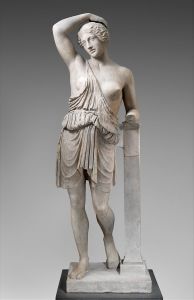
We are warriors from birth. We stand with nations and generations of warriors. And we will conquer.
June 27, 2022
Marginalized People Do Not Exist for Your Exaltation

I am currently reading a book for members of the Church of Jesus Christ of Latter-day Saints about better loving and understanding LGBTQ people. The book is thoughtfully written with a nice combination of the personal experiences of the author (who is the parent of a gay child), Scriptural references, quotes from Church leaders past and present, and speculative theology. I am generally enjoying the read, but there is a recurring theme that deeply bothers me. It especially disturbs me because I have encountered it not only in this book but in various Mormon spaces and conversations nominally dedicated to supporting marginalized people.
The theme goes something like this: “God gave us so we can learn to love better/be more understanding/embrace those who are different from us/expand our conception of who can achieve eternal life.” In the case of this book, that group is queer people. But I’ve seen the same line of thinking used with minority races, people with physical disabilities or mental illnesses, and others. This view centers the majority experience and relegates marginalized groups to nothing more than sidekicks in the main plotline of the majority’s exaltation.
This is a well-known phenomenon in writing circles. Black characters are often characterized as “sacrifices, sidekicks, and scapegoats” in white stories, and many have noted the common trope of female characters being used for nothing more than advancing a man’s character development. There is even a term – “fridging” – for the specific use of physical or sexual violence against a woman to move a male story forward. In the case of a woman’s death as motivation for a man’s quest, it’s a trope known as the Disposable Woman.
As one author writes in response to fridging: “Women have just as diverse a range of stories to tell as men, and shouldn’t need to be raped or otherwise traumatized to prove that.” All marginalized people are the stars of their own stories, not sidekicks. Their stories are just as valuable as anyone else’s. And given systemic and historical neglect of marginalized narratives, those of us in the majority or positions of power should be making an extra effort to center them instead of ourselves.
I think it’s a wonderful thing that Church members are learning to love others, especially those who are different from them, more fully. We must make space for a more inclusive attitude towards those who are marginalized historically and today. But we should never assume that our own personal spiritual growth is the reason they are here. To believe such a thing is to deny the divine nature and eternal destiny of those we claim to love. What about their exaltation? What about their experience as the people around them (often too slowly and many times not at all) learn to love them?
One way to test if you’re falling into this trap is to reverse the statement and see if it still makes sense. Would anyone say that straight people exist so queer people can learn how to be more loving? I’ve never heard it. We shouldn’t say something like that about LGBTQ people, either. It’s not only unkind, but it’s also bad theology.
We are instructed to “work out our own salvation” in Philippians 2:12 and Mormon 9:27, but it is human nature to see ourselves and people like us as the audience in those verses. As followers of Christ, we need to see beyond ourselves and recognize that the Gospel message is for everyone and not just us. We must see marginalized people first as equals on their own journeys of spiritual progression, siblings working out their own salvation. Their influence and impact on others is important, but not as important as they themselves are.
Jesus Christ taught that people come first. He left the 99 sheep to look for the one not because the one had anything especially important or useful for the others. In other words, he did not do it for the sake of the 99. The one was worth it all on its own.
The Lord knows each of us by name. He understands what we’re going through, which means he sees us the way we see ourselves: as main characters in our own stories, full of complexities and desires and struggles and hopes and dreams. Nobody is a sidekick to someone else’s exaltation. So let’s stop acting like they are and instead start learning to love more like the Savior did.
June 26, 2022
Sacred Music Sunday: Sweet Hour of Prayer
I’ve spent three decades as a musician. Mostly I’m a vocalist. When it comes to instruments, I’m a dabbler. I’ll pick up an instrument, play it for a bit but never long enough to get good, and then get bored with it. I’m bad at a lot of instruments. I’ve always felt like a deficient musician because I don’t play the piano.
 Person in Praying Hands on Pink Surface https://www.pexels.com/photo/person-i...
Person in Praying Hands on Pink Surface https://www.pexels.com/photo/person-i...I took lessons, I can plunk out a few hymns in a pinch, and I know what keys go with which notes. I try not to subject anyone to my playing, and when people ask me if I play, I respond with “A little bit but not very well.” They assume that it’s false modesty when it’s really the truth.
When I bought my house, I decided to get an inexpensive used piano. I had grand visions of playing it and finally getting good. I found one for a reasonable price and it sat in my living room as a decoration and conversation piece. It was desperately out of tune but I kept putting it off.
Earlier this week I finally got it tuned after owning it for three years. With a freshly tuned piano, I decided to try my hand at playing. I started out with Sweet Hour of Prayer because it’s one of the easiest hymns in the book and one I used to be able to play with little difficulty. I could barely remember how to play! My hands cramped up from using muscles I hadn’t used in years. I tried a few other hymns in the hope that I would remember how to play one of them. No such luck. I have my work cut out for me if I want to get back what little skill I had in the past.
Prayer itself is kind of like my piano playing – it takes effort and practice to build that relationship with the divine. Sometimes it can be hard to get back into it after a period of not practicing. But just as my hymnal and piano are there waiting, God is there waiting as well.
June 25, 2022
Is it a balancing act?
“So Mom, I forgot. Am I allowed to marry a boy or a girl?” my then 7 year old asked me with genuine curiosity.
“When you’re a grown up, you can marry anyone you want to, sweetie,” I told her without hesitation.
“Thanks, I just always forget that,” she replied flippantly and the conversation could have been done.
I paused and wondered whether I should let that be the end of the conversation. It satisfied her. It satisfied me. I mainly want her to know that her sexuality is not something she should ever worry about. I’ll support her with whatever she learns about herself as she grows.
But then I worried she might have the shock of her life when she starts Young Women’s and learns the Church doesn’t approve of what I’d said.
I hesitated, then said, “The only thing is that if you marry a girl, you’re not allowed to get married in the temple.”
Immediately she replied, “Oh, that’s fine – there’s lots of pretty places to get married. Like, I could get married in the rhododendron garden.”
OK, all true. But I paused again. This time wondering whether I’d done enough over her life to share with her my beliefs about eternal families. She clearly did not value the temple – a place where I believe I’ve made covenants with God to have an eternal family. On the other hand, I was glad that she knows that I’ll be there for her wherever she chooses to get married.
Delicately, I said, “True, you can get married in lots of beautiful places. Dad and I chose to get married in the temple because we made a promise with God to be together forever there.”
“Yeah, but I think God would let us be together forever anyway.”
And then she was satisfied and on her way. And…she’s probably right.
So now the question for readers – for those who do believe that they’ve made covenants with God, but also believe that there are real problems with the way the mortal-led church implements practices – How do you teach your kids? What’s the balancing act you play?
 This kid is probably right
This kid is probably right
June 24, 2022
I Still Remember
*Trigger Warning- Mention of Sexual Assault.
When I was 18 years old, I was sexually assaulted for the first time.
Only two years out of high school, I believed that my mind that there was something deeply broken within me. While I was still single after my last relationship ended with a cheating scandal and the ultimate betrayal from a former friend, my other girlfriends seemed to have men lining up around the block to date them.
I didn’t think I was awkward then. In those days, while they casually dated, I wore my religion on my sleeve. I was the good church girl who didn’t veer too far from the sidewalk in fear of being hit by the incoming traffic of the world. Now years later, I realized that this naivety probably contributed to being targeted by men with less than wholesome motivations.
Back in the mid-2000’s the place to meet friends and prospective boyfriends was over social media. Like other girls, I pimped out my Myspace, added all my classmates on Facebook, Hi-5 and Tagged. My profiles contained Panic At The Disco lyrics, music compilations and random quotes which made me seem “so intelligent”. I realized now that my head was so far in the clouds that it was impossible for me to see land beneath my feet. In my mind, I believe the world to be a good place and a safe place.
Looking back, I was so naive… too naive.
 In the twelve years since I met Predator #1, I am still in fear that he will magically appear in my life again, demanding what he craved from a silly nineteen-year-old who thought they had figured out the world.
In the twelve years since I met Predator #1, I am still in fear that he will magically appear in my life again, demanding what he craved from a silly nineteen-year-old who thought they had figured out the world.I eventually turned to social media for more than just music and stalking crushes. After asking my friends for ages to set me up, I caved. I began to take more risks as I struggled to find my way into a dating pool that wasn’t quite warm. I dipped my toe into danger, closing my eyes to the searing pain.
After all, this is what adults did. They took risks.
Not long after, I was added by Predator #1. He was tall, good-looking and being a few years older, seemed to have his life together. Most importantly, he drove a truck-the number one item on my checklist. We spoke casually at first, spending time drifting between Messenger and Whatsapp. Eventually, he confessed to a crush on me. And in my under-developed, naïve brain, I ate it up.
A few days later, he invited me out on a date. I was so excited. I boasted to my friends that for once I had finally snagged a guy on my own. Despite my excitement, I smartly took along my vex money (money taken by women on a date to ensure they can cover their own costs). I would not be caught off guard…or so I assumed.
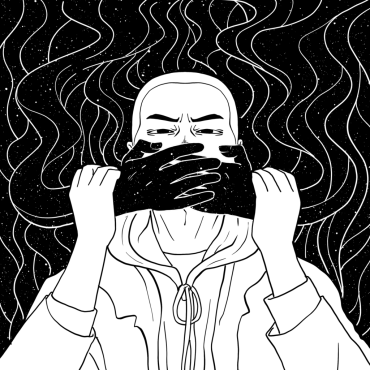 I felt trapped. In all my years, I had never lost the ability to lose my voice. Imaginary hands seemed to grab me from the abysss, muffling any attempts to speak.
I felt trapped. In all my years, I had never lost the ability to lose my voice. Imaginary hands seemed to grab me from the abysss, muffling any attempts to speak. That night, he picked me up in the red truck of my dreams, but I would soon discover that it would fast become a nightmare. Over dinner, we discussed various aspects of our lives. He praised me for my intelligence and bubbliness. And for once, I felt calm instead of making anxious comparisons with my friends.
After dinner, we strolled along a path taken by couples who wished to watch the ocean by moonlight. Romantic right? As it was my first time, I walked hand in hand with danger without a second thought, only growing more hesitant as he tried to take me further down the beach away from the streetlights that would ensure my safety.
Despite being so sheltered, I noticed the disarray of couples who ventured further as they used the shadows as their own personal love hotel. So, making an excuse, I managed to pry him back to safety instead of choosing to make out where there were at least a few witnesses.
The night soon ended…or so I thought. I realized that he took the long way back to my house as if prolonging his opportunity to talk me into physical aspects which I just wasn’t ready for. Still, I chattered on as I tend to do when nervous, giving him the address to my house.
With a defeated sigh, he took me home, not taking the way I was accustomed to but taking me home never the less. The nervousness built in my stomach as I started to see familiar landmarks come into view. Then, a few meters away from my street, he could deny his twisted fantasies no more.
Things which I can’t go into detail much still plague me to this day. At first, I tried to tell myself that this was what I wanted. I tried to justify that I had kissed this man. I tried to tell myself that I had led him on and caused him to feel as though I wanted this too. Then he whispered the words I thought I would only hear from my husband telling me that he deserved to get what he wanted.
In less than a minute, he had reduced me to a common slut. The blinders came off of my eyes as I realized that he had only wanted to sleep with me. At this point, my mind kicked into high gear as I leaned into what I was good at. I decided to arm myself with nervous energy talking non-stop as I pushed his hands off me, removing them from places where they didn’t belong.
 As I have grown older, I haven’t limited my voice. I speak up. I stand firm.
As I have grown older, I haven’t limited my voice. I speak up. I stand firm.I call out hypocrisy and toxic masculinity when I see it. Still, this makes me unlikeable, untamed, and unladylike. Somehow, I just haven’t cared to pay attention.
With a dejected sigh, he put the car into drive. As I saw my humble home come into view, I burst into tears.
Eventually, I discovered that he was either engaged or married. It didn’t matter. What mattered was that a part of my innocence was gone even if it was still hanging on by a thread. I beat myself up because of what I had encouraged, telling myself that if I never kissed this man he would have no reason to respond in such a way.
Almost a year later, I faced another sexual assault attempt. This time instead of cowering with fear, I fought back. I armed myself with a knife as I swung violently. If I had to go to jail, it would be worth it in my eyes. THIS WOULD NOT HAPPEN TO ME A SECOND TIME!
As the years passed, I brushed these two incidents from my mind. I refused to play the role of a victim. I used all of the techniques learned in therapy to wrap my trauma into a small box, tucking it away in the back of the wardrobe of my life. I tried my hardest not to lean into the extreme emotions they caused.
Still, life doesn’t always play fair. Recently, my anxiety brought these neatly tucked emotions back to the surface. For days I could only lay in bed as I swallowed back the pain as if it was fresh. I could almost see the details as if they were happening at that moment. I could still remember the scent of my predators. They seemed to be right at the moment with me…laughing at me….mocking me.
What I have come to realize is that in some small way, these encounters have changed my outlook on love,sex and relationships. The thought of love and marriage has never been something that makes me happy. I haven’t relied on someone wholly with my entire heart since then. I haven’t fully trusted anyone since then. I have run away when people get too close as the ghosts of my past hold my life at ransom.
In many ways, my predators win.
Still, it’s difficult to reconcile my past with my future as I belong to a gospel of marriage. I belong to a church where the expectation is to marry young. But as I factor in the experiences in my life and relive the dark trauma I have experienced, I recognize that sexual assault plays a much bigger role in how I view dating. It changed my perception of love. It warped my perception of needing someone.
I recognize that my sexual assaults were never my fault. I was a naïve girl who didn’t know any better. I was a girl fighting back with all the tools I was equipped with. And I hope that I’ve somehow fought the war well, even if the scar tissue remains.
I deserve more than to be the object of one’s desires and the bane of someone’s existence. I deserve good, wholesome, decent, and uplifting love…even if it means waiting a lifetime.
The skeletons of the past do not define me. They no longer hold me hostage. I release them now…forever more.
Amen.
June 22, 2022
Guest Post: A Call for a Trauma-informed Faith.
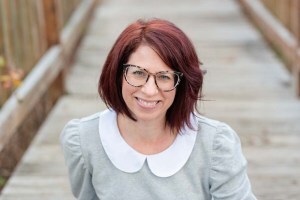 Guest Post by Joey Holliday. Joey Holliday is a licensed mental health therapist, educator and photographer. She has a private practice in Boston, MA. Her website is joeyholliday.education.
Guest Post by Joey Holliday. Joey Holliday is a licensed mental health therapist, educator and photographer. She has a private practice in Boston, MA. Her website is joeyholliday.education.
I have been a mental health therapist working with members of the LDS faith since 2007.
In 2017 I began an intensive study of trauma and attachment theory. Things started to shift for me as I did, and concerns grew around the way principles were taught in the church.
Through my studies and training, I consciously became aware of what I have always unconsciously known and held. I was reminded where truth and wisdom are found.
Our bodies.
Our bodies know what we need.
As I gained a deeper understanding of how the body responds when it feels overwhelmed and what is needed for the body to feel safe, I began to realize how much the body and biology need to be respected and understood in our faith. As well as how much harm is happening in our faith because this knowledge is missing.
Our bodies are divinely designed. Our Heavenly Parents know how they work and lovingly honor that. We need to too.
I believe if we truly knew and compassionately understood how our bodies are designed to help us survive experiences that are overpowering to us, there could be a profound change in our faith. It could be a safer and more welcoming place for all those who want to participate.
Our bodies need to feel safe to connect, grow, heal, and restore what has been lost or missing.
Safety is everything, my friends. Our bodies know it and yearn for it.
My journey of shifting perspectives began as I studied a caregiver’s qualities that provide a secure attachment.
Attachment theory helps us understand how our internal patterns of how we see ourselves and interrelate with the world are created early in life through the types of communication and interaction with our caregivers and are reinforced by experiences throughout our lives.
When we have a secure attachment, we are more able to feel solid/safe in our bodies, trust ourselves and others, and have the skills inside of ourselves to handle the challenges that come our way.
If we don’t have a secure attachment, we are more likely to be overwhelmed easily (even with small things), be inflexible, not trust ourselves or others, and believe that something is wrong with us.
There are certain qualities of our caregivers that provide the right physiological conditions to develop a secure attachment.
As I read about those qualities, there was NO mention of a caregiver who used fear-based tactics, showed anger or disappointment in choices, created conditions for a child to prove their love or worth, or a desire to control them.
Qualities that were mentioned that helped a child to feel safe and secure in their body included (but are not limited to) kindness, a welcoming presence, willingness to listen and attune to the child’s wants and needs, ability to stay emotionally close even when the child is dysregulated and has a loving countenance.
Through studying, I was reminded of the true character of our Heavenly Parents. Their only agenda for them and Jesus Christ is to comfort us and help break down the world when it is too big for us. Nothing else.
We have forgotten and lost touch with who Heavenly Parents are and why we are here.
We do not earn their time, love, or attention. And we do not need to prove our ability to return to them by becoming more holy or righteous. Jesus Christ lovingly guaranteed our return. We are here learning how to become Gods and our Heavenly Parent’s peers.
My friends, emotional safety cannot be found when worthiness is on the line.
If we feel we need to prove our worthiness (a sense of belonging), this leads to a sense of threat. When we feel a sense of threat in our bodies, we do not feel safe.
No part of me believes our Heavenly Parents want us to feel unsafe in our bodies and feel like we don’t belong with them. We suffer in so many ways when we feel unsafe, impacting our daily functioning.
Another physiological condition that provides a secure attachment is called mindsight. I learned this concept from the work of Daniel J. Siegal, MD. He describes mindsight as “the ability to see the internal world of self and others, not just to observe behavior.”*
Our Heavenly Parents see below our behavior because they know how our bodies work.
They know we are so much more than our choices because they understand what impacts our choices-our thoughts and feelings. Our thoughts and feelings are directly impacted by what is happening with our nervous system (where a sense of safety or lack thereof is coming from). Our experiences in life affect our nervous system.
When something happens that is too big for our body to handle, and we don’t get the support needed for it to get broken down, this leaves our body in a state of fear until the experience(s) are processed. Trauma symptoms develop when overwhelming feelings are not processed in our bodies.
It is important to understand no one defines what is too big for your body or what is considered traumatic, except for you!
As noted before our bodies were divinely designed, and they were lovingly created in a way to protect us when things are too big for us to carry in the moment. They will do whatever they need to protect us (survive) when we feel or anticipate pain.
When something is happening in the present that is overwhelming to our bodies or reminds us of something that is not yet processed from the past, our bodies unconsciously react to protect us. Our prefrontal cortex shuts down. This part of the brain impacts our ability to think, be flexible, regulate emotions, be empathetic, and have awareness.
We are not consciously choosing our choices when we feel a sense of threat of any kind or in any proportion. All our bodies are trying to do is survive and are prioritizing this.
Undigested stress and trauma symptoms impact our choices.
I feel this precious knowledge of how our bodies work is not known by our leaders and in our faith.
But it is absolutely known by our Heavenly Parents. They see below our behavior.
Our Heavenly Parents truly understand what is impacting us and honor that with tenderness and care, not disappointment or judgment.
They know that maladaptive choices hurt us and others. But they also know there is so much more to us than any given choice we make.
Our Heavenly Parents know the thoughts and the choices we make in the moment may have nothing to do with our values, morals, willpower, or belief in them due to the state of mind. They know the thoughts and choices we make have everything to do with the sense of safety we feel in our bodies.
Our Heavenly Parents know when we feel safer, we can make consciously choose our choices. We find safety through doing the emotional work to heal.
We can do this critical work with our Heavenly Parents and Jesus Christ’s support. They see our pain and want to help us.
All my (ongoing) study of trauma, attachment theory, neurobiology, and what is needed to heal truly led me to create a course and desire to build a community for members of the LDS faith where individuals gain education on trauma and attachment wounding to support their healing journey.
I genuinely want members to find and feel safe with themselves, others, and in their participation with their faith. I want the church to be a safe place to belong, and I fear for so many, it is not.
I combined spiritual and psychological principles in the ‘Finding Safety with Self, Others, and our Heavenly Parents’ course. I present education on trauma and attachment theory and discuss how certain principles are taught in the LDS faith that is unintentionally creating an unsafe environment for members by reinforcing trauma symptoms.
I am not trying to be critical of our leaders or the church. I only want this knowledge to be known so individuals can work towards feeling the relief their body yearns for and learn to feel safe in their bodies and with one another.
I fear many in our faith do not recognize the pain they are in and the needed healing. The impact of trauma causes us to want to push our feelings away (survival tool). But religiously, we are also encouraged to focus externally (our behavior/on others), then be with ourselves internally and notice what we are feeling.
I pray for this to change. I believe so many need personal healing within our faith. We are doing the best we can, and being hurt and wounded is not an individual’s fault. But I see the pain in my interactions with members, and through the comments, I hear at church. My heart aches for the suffering that is unattended and not seen or known.
I also believe that if we were to address and learn how to heal individually, we could move towards a collective healing experience in our faith.
Collective healing, too, is needed. We need to heal as a community and learn how to create a sacred space where all suffering is welcomed, seen, and honored. As we learn to see our pain, we are more able to see the pain of others.
And isn’t this what we want and teach in our faith?
This, my friends, is my call and passionate desire to educate and create a safe community where we can learn together about individual and collective healing through a trauma-informed lens and faith.
*Reference:
Siegal, D. (2020). The Developing Mind: How Relationships and the Brain Interact to Shape Who We Are (3rd Edition). The Guilford Press.
June 21, 2022
“Men” Doesn’t Include Women (Except When It Does)
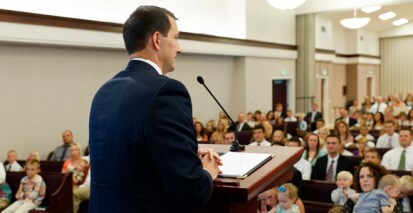
A few weeks ago, a man gave a talk in a sacrament meeting I was visiting. He spoke on a Come Follow Me lesson that included the book of Numbers. He said that Numbers could be a difficult book to read because of, well, all the numbers. But he said you could find God’s love there, too, and he used the example of when God commanded a census to be taken of all the Israelites and that each individual was counted and named one by one. His point, I think, is that this anecdote was proof that God values and loves us individually.
It was a nice thought, but I immediately flipped to Numbers chapter 1 and saw, with sinking heart, exactly what I expected to see. Only men over the age of 20 were counted in the census. Only men were named one by one. And the census was for a roster of potential soldiers. There is a second census taken in Numbers chapter 26 for the same purpose, as well as for dividing the land for their inheritance. The Levites were excluded from the soldier census due to their ecclesiastical responsibilities, but in the second census, each Levite male of one month of age or more was counted. With perhaps a very few exceptions, girls and women were not counted or named at all.
Not every insight from the scriptures has to be universal, but I am so tired of the lack of women and the lack of acknowledgment that women are missing. And women are missing and underrepresented everywhere: they are missing in our scriptures, in our lesson manuals, in priesthood quorums, in our church leadership on every level. They are missing in our General Conference speaker line ups, in our church councils, in our hymns and children’s songs. Women are missing in the temple ceremony, in our understanding of the afterlife, and in the Godhead.
These are all facts. And yet, we do not acknowledge them. When we pretend this inequity doesn’t exist or we fail to point it out, it sends the message to women and girls that they are inessential, that they are afterthoughts, that their personhood is subsumed under whatever male they happen to be attached to.
The man who gave the talk I referenced may not have noticed that an entire gender, plus children, was excluded in this census when he had his insight. As a man, he is able to take for granted that all words for humankind in the scriptures, except for the very few uses of “women,” include him. Women are so used to identifying with men and male characters and assuming that male-gendered language applies to us (except when it doesn’t) that many of us don’t recognize when we’re excluded, either.
I wonder, though, if he’d have had the same insight if the genders were reversed in these particular chapters. If the scriptures had said, “Take a census of the whole Israelite community by their clans and families, listing every woman by name, one by one” (Numbers 1:2, NIV), if he was not explicitly included in the verse due to his gender, would he still have felt that it was an example of God loving all of us individually?
I have no doubt there are women who have had the same insight that this man did, despite their lack of inclusion in the gendered language. But men are not at all accustomed to inserting themselves into the gendered language of scripture and doctrine as women are. Their inclusion is so taken for granted, I doubt most men (particularly straight, white, cis men) have considered what reading the scriptures is like for people who are only marginally, if at all, included in the text, the speakers, and the stories.
Since basically all of our leaders fall into that category, I am pessimistic that acknowledgment or even awareness of this issue will improve on a church-wide level anytime soon. Until then, women will continue to sit through talks and lessons that assume “men” means “people” (except when it doesn’t).
June 20, 2022
Let’s Talk Polygamy and Sex
I (like probably anyone who’s ever spent time with this topic) have thought many times over the years about how sex works in a polygamous community or marriage. It’s hard to broach the topic and *not* think about it.
There’s also a new documentary series on Netflix right now called “Keep Sweet: Pray and Obey” about Warren Jeffs and the FLDS sect of Mormon fundamentalists that still practice polygamy. It features some incredibly brave women who left the group, and according to my Netflix home page is the second most watched show on the streaming service right now behind Stranger Things.
I must say, it is an excellent series. Like many other people, I have been sucked into books and shows about fundamentalist Mormons many times over the years – mostly because it all seems so crazy and yet wildly relatable to me as a girl who grew up contemplating my eternity as a plural wife in the Celestial Kingdom, even if I didn’t have to practice the principle here on earth yet.
In the first episode women share their experiences being married as much younger women to Rulon Jeffs (Warren’s father and predecessor), including their first kiss being with an elderly man and their first sexual experience (that they were totally unprepared for) being Rulon lying on top of them and telling them to spread their legs as they froze in complete shock. Calling a young woman his “wife” before forcing himself on her is obvious in retrospect nothing less than rape, but at the time they didn’t know they had an option to retreat from the situation and choose their own romantic partner.
In later episodes you hear the horrific crimes committed against underage girls in the name of religion and polygamy, all of which helped put Warren Jeffs in prison for the rest of his life. This whole series has me thinking about the sex lives of the women involved in the practice of plural marriage, from the violent acts of sexual assault in girls and women who had never even had sex explained to them before their new husbands forced themselves on them to the extreme lack of intimate relationships the wives of high priesthood leaders can experience in their marriage, both in modern day fundamentalist sects and at the founding of the church in the 1800s.
Here are a few of my thoughts, in no particular order:
THE WORST SEX DREAM EVER
A few years ago, I had a bizarre dream in the middle of the night. I dreamt I was a very young pioneer bride of Brigham Young. (The night before I’d had KBYU on the TV on silent for about ten minutes, and it was playing the movie “Ephraim’s Rescue”. I wasn’t sure, but I thought there was a character onscreen who was supposed to be Brigham Young. He was sitting on the side of a busy room and kept beckoning young men to come talk to him. I’m not sure what was going on, but I thought, “You big bossy jerk. Stop making everybody come talk to you! They look nervous and awkward.” That was probably unfair, but it showed my intense inner angst about the name on my college degree, that I couldn’t even like silent portrayals of him on television.)
In my dream I was a super beautiful young teenage bride, and I was admiring myself in a particularly alluring pioneer dress in the mirror. I got mad, and I stormed into Brigham’s office and demanded he sleep with me right then and there. I said, “I am a beautiful young woman, and I have needs, and it’s not fair that I only get one night a month, and you are my husband and this is your job, and so I demand you stop what you’re doing and take care of me RIGHT NOW.”
Thankfully my subconscious saved me from the trauma of that dream continuing any further, but I remember being so mad about it the entire next morning. The young women who were married to old priesthood leaders in the church – they were YOUNG WOMEN. With desires, and needs! They could’ve fallen in love with a man their own age, had a regular married life full of love and fulfillment and joy, and instead they were on a forty night rotation with an old guy and raised their kids alone.
I started to wonder if LDS men could even imagine being an 18 year old virile young man, given in marriage to a 55 year old woman with forty other husbands already (and more to come), and being told that SHE was the only outlet for his normal teenage boy passion, and that he would only get her once every forty nights or so. How would he feel about having to compete with the other guys for her affection? What if she was sick or too tired on his night, or he wasn’t her favorite, or he was past his prime, and he’d get nothing at all? Had anyone thought to ask him if he was sexually attracted to a much older woman who was born the same year as his grandmother? Would he be okay with seeing her flirt, court and maintain many other romantic relationships besides him, but know that he must keep himself 100 percent chaste outside of their rare nights together, and that even talking or flirting with a girl his age could bring down eternal dammation and public shame on his head?
YOUNG BRIDES OF CHURCH LEADERS
I once had a discussion with someone who believed it made perfect sense to ban gay leaders in scout and youth programs. It wasn’t because they believed a gay person was any more likely to assault or molest a youth, but they felt it was safer to just take that temptation totally off the table. A 30 year old straight bishop wouldn’t ever find himself romantically attracted to a 17 year Priest in his ward, for example, but a gay one might. My friend said he could imagine even good men getting into bad situations if they were working with attractive older teen girls, and it’s just better that (straight) women lead girls, and (straight) men lead boys.
That is a huge topic with plenty of things to discuss (like why then is it okay to have teenage girls alone in bishop’s offices talking about sexual experiences, and priesthood leaders DO go to girl’s camp and stay the whole time!), but I’d like to maintain course and focus on polygamy.
This person said to me, “It would only follow reason that if we had men leading teenage girls, there would be more situations where they fall in love with or become sexually attracted to the girls, and awful scenarios follow where those girls are victimized and become victims of statutory rape.”
I was thinking, “Forget the whole gay leader issue for a minute – isn’t being in authority over teenage girls and having romantic and sexual relationships with them as a result EXACTLY what Joseph Smith, Brigham Young, Heber C. Kimball and many other men did when they took young women in their wards and stakes as their wives? Except instead of feeling ashamed or worried that someone would find out, they believed God was giving them authority (even commanding them) to take these girls as their brides, which made them even more emboldened to court more women and girls?”
How, I wondered, could this person be so worried about a modern church leader (gay or straight) having a romantic relationship with a teenager under their charge, but simultaneously dismiss polygamy of early church leaders as being non-problematic? Why could older men openly court young girls back then, but if it were to happen nowadays in the church it would finally be a problem for faithful members?
BRIGHAM YOUNG’S MANSION HOUSE
I toured the Brigham Young house with a friend years ago. I hadn’t been there since I was a kid. A soft spoken Vietnamese sister missionary showed us the family room and explained that Brigham Young would gather his family every week in that room for, you guessed it, Family Home Evening!
I kind of chuckled, raised my hand, and said, “So…was it a rotating FHE, because he had like, 50 wives and families? There’s no way they all could fit in there at once. Did they each get one Monday night a year? Or did they all cram in here elbow to elbow, spilling out into the hallway?”
Another man in the group offered that he thought Brigham Young only had 19 wives. I said “Maybe he only had children with 19, but I KNOW he had over 50 wives. And even then, how would you fit 19 wives and children in this one room each week? And did he just ignore the other 30 wives during family events? In plural marriage, are you only invited to family events with your spouse if he’s successfully impregnated you? How did it work?”
The poor sweet sister missionary (I’m so sorry to whoever she was, because it shouldn’t be her job to defend Brigham Young to the world) sort of dodged my question and said, “I understand that polygamy was to help the widows, and those who had lost their husbands and needed someone to support them financially, as well as to give them the blessing of priesthood in their home.” I wanted to say, “Okay really, we know they were not *all* grateful elderly widows, and how did they get the priesthood in their homes when he only apparently lived with one of them in this house here???”
Instead I just giggled some more and said, “But yeah, they still wouldn’t all fit in here, so I’m just saying like….he didn’t actually gather his WHOLE family here each week for FHE. Right? Anyway, not important. Never mind.”
Afterwards my friend asked me, “Why were you being so hard on those sister missionaries?” I admitted, “I know it’s not their fault and I was pushing the issue, but what they were taught to say was hilarious and clearly historically inaccurate. Someone had to say something!”
My Brigham Young admiring friend read up that night on the internet and told me the next day that the sister missionary was actually right, he DID marry widows to the tune of like, 16 of them. And get this, they said – only about five of his brides were actually underage teenagers. My friend (who is still my friend, even if we disagreed about this) said I was being rude by saying behind the sister missionary’s back that she was wrong and implying that Brigham was doing things he really wasn’t. He didn’t have 50 underage brides – he only had five that were underage! He had more than twice as many widows than he had high school aged girls.
I contemplated explaining to, I don’t know – my husband (or the court system!) that hey, I just married myself to five teenagers – but I’ve also married twenty other older men and only slept with about forty of my fifty extra husbands anyway. Would they all be perfectly okay with my five underage boys because the majority of the men I was having sex with were actually a few years older than me?
BRIGHAM YOUNG’S WIDOWS THAT HE *WASN’T* SLEEPING WITH
Yes, I know that Brigham Young did take widows as his wives, and that some of them were even older than him and many of them didn’t bear any of his children. Some of the older women (which didn’t usually mean elderly and frail, just not in their twenties) probably didn’t have babies because they were simply past child bearing age, or old enough that their fertility was limited and only sleeping with Brigham several times per year wasn’t enough to cause a pregnancy. Even then, I remember reading a disturbing quote from Brigham Young about one of his older brides where he said essentially, “I want it to be clear to everyone that this is a marriage for eternity ONLY. I am not having any kind of intimate relations with this particular wife, who is old and very unattractive to me.” (That’s not an exact quote because I have forgotten where I read it, but that was very much the feeling I got from his words.)
Is that really better, knowing that he wasn’t having sex with all 50+ of his wives? What if you were that widow? You’d lost your spouse on the plains and you and your children couldn’t survive on your own (because the welfare system in Salt Lake in the 1800s was insufficient), so you take Brigham up on his offer to make you his 51st wife. He then publicly makes it very clear to everyone that your marriage is just a pity marriage, because he has zero interest in any kind of sex involving you in any way. He’s still got dozens of women to spend any given night with, whereas for the rest of your entire life you are not allowed to date, fall in love, be kissed, or find any kind of romantic companionship for yourself because you belong to him. You are his eternal wife – but he’s never going to do anything for you other than make sure you don’t starve to death.
And although he’s made it very clear he’s never going to have a physically intimate relationship with that particular wife, she’d better not dream of being sexually unfaithful to him. She must live out her life celibate from the point of her marriage on, or risk death at the hands of Brigham (a believer in the doctrine of Blood Atonement). Here’s what he had to say about a wife that would dare cheat on him: “Suppose you found your brother in bed with your wife, and put a javelin through both of them, you would be justified, and they would atone for their sins, and be received into the kingdom of God. I would at once do so in such a case; and under such circumstances, I have no wife whom I love so well that I would not put a javelin through her heart, and I would do it with clean hands.”
Does this sound like a great arrangement for the women a prophet takes as a wife and chooses not to have sex with? The wife must put herself on ice for the rest of her mortal life, as he will consider having a relationship with her only after she’s resurrected and hot enough for him.
MY FRIEND’S GREAT GREAT GREAT GRANDMOTHER, A BRIDE OF WILFORD WOODRUFF:
My high school friend wrote to me several years ago about her GGG grandmother, Delight Stocking. She specifically was trying to honor her name by saying it more, and sharing her story. Delight was promised to Wilford Woodruff when she was 8 or 9 in Nauvoo and then married him when she was 18 and he was 50. Her “title of nobility” on Family Search is wife 5 (she found this so strange, and knowing that her ancestor never knew any differently haunted her).
My friend grew up hearing about how wonderful it was to be descended from a prophet, but never heard anything about the woman she also came from.
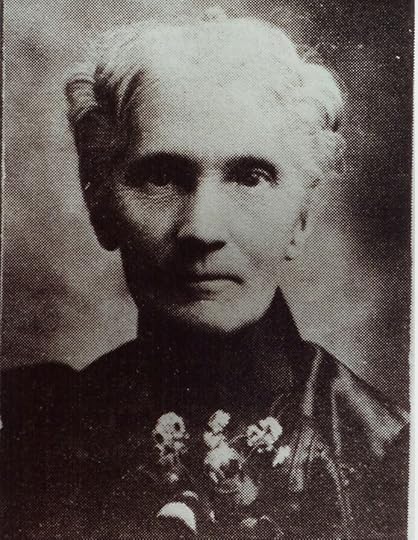
Delight Stocking.
Delight spent her teenage years knowing that her first sexual experience was going to be with that older man up on the stand at conference, and he looked out at her as a child, knowing he would be the man to take her virginity someday. She didn’t get to date, have boyfriends, flirt, or dream of her wedding day with the boy of her dreams. She just knew that at 18, that 50 year old guy on the stand would be her husband.
My friend had tried very hard to unearth more about her over the years. She did have tremendous faith and was a wonderful mother to her five children, but was extremely lonely in her later years (and probably most of her life). That might be the saddest thing in all of this, that she never really had a companion.
For my part, I can’t fathom the dynamics of being a teenager marrying a 50 year old prophet. He’d be experienced sexually and in life in general, and she’d be a baby. She’d have spent her life being told what a spiritual giant and leader he was. There’d be zero chance for even the semblance of an equal relationship.
It’s difficult to watch or read about Warren Jeffs and have everyone dismiss his marriages to multiple women as manipulative and self-serving, but then see the same people dismiss the very similar events that happened in our own church. The plural wives of our early prophets would often write a testimony of polygamy – but so do the wives of Warren Jeffs. Is clinging to a testimony of the practice a way of coping with a life you wouldn’t have chosen on your own?
MORE WILFORD WOODRUFF
For most of my life, Wilford Woodruff was just the name I mixed up with Woodrow Wilson, the US president. I honestly didn’t know much about him. After my friend told me the story about Delight though, I began to perk up when I heard details about his life, especially his practice of sealing hundreds of deceased women and girls to himself in the temple as birthday gifts. I won’t tell this story here, but you can read a guest blog post all about it at this link and it will make you scream stuff:
https://www.the-exponent.com/mary-jane-wilford-woodruff-and-the-267-dead-wives/
IN CONCLUSION
I’m a heterosexual 41 year old married woman who was raised with the belief that priesthood holding men in my church were directed by God to take multiple women as extra spouses, both for time (in the early church) and all eternity (both the early church and the current church). I was simultaneously repulsed by the idea of FLDS leaders choosing dozens of women for only themselves, rolled my eyes at ancient kings who kept harems of women, and felt bad for married couples who were told by their cult leaders that God had commanded the wife to turn herself over to the leader to be one of his wives instead of her husband’s. Despite these being black and white issues of wrong and right to me, when I heard my church leaders (and really, all men in my church) doing the same exact thing I just shrugged and sadly thought, “I guess that’s what I have to do someday because I’m a woman.”
Well, what if it turns out that polygamy in this coercive form is wrong EVERYWHERE, no matter what religion the men commanding it are?
I watched the Netflix drama Waco about David Koresh a couple years ago, and the following line from the negotiator speaking to David jumped out at me:
We all have to come to our own conclusion on this topic. I think it’s pretty easy for most people reading this to guess mine.
June 19, 2022
Liberation and Community in the Book of Mormon
After realizing that I could not stay in the LDS Church, I was interested in Community of Christ because it still held the Book of Mormon as sacred scripture. I read the book many times since my first reading at age 13 and my interpretation of the book changed over time. All church lessons on the Book of Mormon emphasized the larger meaning of the text as one that warned against pride, and that we should pay close attention to the specific lessons of specific writers. Initially, I sympathized with Nephi and believed him when he wrote that his brothers were awful and that Lehi was a good and faithful parent. Later, I understood Nephi as an unreliable narrator whose story was more of a cautionary tale.
When I left the LDS Church, I was questioning my belief in the historicity of the Book of Mormon, but it still felt important to me. It had promised me that a better life was possible when when I was struggling with my family as a young teenager. It comforted me when my mother died. It served as an anchor in my life as a young adult. It was something I made time for even as my small children overwhelmed me. The Book of Mormon felt too important, too significant to just let it go. But I didn’t know how it could be a part of my ongoing, post-faith transition life of faith if my beliefs arounds its origins had changed so fundamentally. Could this once-sacred text still be spiritually meaningful to me?
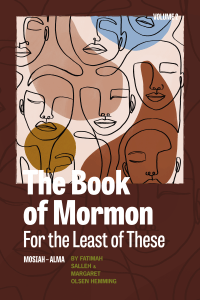
Yes, was the answer I eventually came to, but I was going to need some help acquiring new tools of reading and understanding. The first volume of Fatimah Salleh and Margaret Olsen Hemming’s The Book of Mormon for the Least of These was exactly the tool I needed to learn to read the Book of Mormon in a different way. The first book was revolutionary in its framing of the text because it centered those at the margins of BOM stories and even those who were not named in those stories. Salleh and Olsen Hemming demonstrated the ways in which readers could use their scriptural imaginations to imagine a fuller story than the one presented by BOM narrators, very much in the spirit of Wilda Gafney’s Womanist Midrash and other womanist biblical interpreters before her. I immediately used these ideas to help me preach from the Book of Mormon in a Community of Christ setting.
The recently-released second volume, which covers Mosiah to Alma, continues to guide readers to understand the text through the lens of liberation theology and womanist ethics. The authors hit their stride in this second volume. In centering the people at the margins of BOM stories, Salleh and Olsen Hemming comment on the teachings of BOM prophets and the ways in which those teachings do and do not support the liberation of those at the margins or support the thriving of whole communities. This critical lens reveals BOM prophets as both inspired and limited in their understanding of the world around them and of God.
I recommend this book to those who are looking to deepen their reading of scripture beyond plain text readings and to further their understanding of the gospel in terms of social justice. As someone who has left the LDS Church but still wants to find meaning and relevance in the Book of Mormon, Salleh and Olsen Hemming have written an invaluable resource that has helped me renew my faith and maintain a connection with this sacred text.

